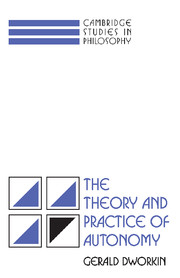4 - Autonomy, science, and morality
Published online by Cambridge University Press: 05 June 2012
Summary
The concept of autonomy has assumed increasing importance in contemporary moral theory. Appeals to the ideal of an autonomous moral agent play a role in grounding moral argument that appeals to sentiment or self-evidence or intuition played in earlier centuries. In such discussions moral judgments are often contrasted with factual or scientific judgments and claims are made about autonomy (as well as related notions such as authority and objectivity) in the moral context that are sharply distinguished from parallel claims in the scientific context. My aim in this essay is, as they say on prelims, to compare and contrast the nature of autonomy in morality and science.
In Chapter 1, I have characterized autonomy as the capacity of a person critically to reflect upon, and then attempt to accept or change, his or her preferences, desires, values, and ideals. The idea of moral autonomy is a particular case of this, and the rough idea is that persons are responsible for, and have the capacity for, determining for themselves the nature of the moral reasons, considerations, and principles on which they will act.
When I speak of autonomy I shall take this to be a property of persons and I shall only indirectly be concerned with the discussion that has proceeded under the heading of the autonomy of morality, that is, the connection or lack of connection between facts and values. I am primarily concerned with autonomy as specifying certain features of persons involved in their deliberations upon moral issues. I am concerned with moral autonomy and not the autonomy of morals.
- Type
- Chapter
- Information
- The Theory and Practice of Autonomy , pp. 48 - 61Publisher: Cambridge University PressPrint publication year: 1988
- 1
- Cited by

